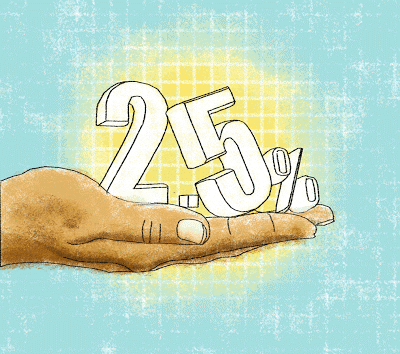-CONCEPT OF ISLAMIC JURISPRUDENCE AND LEGAL RULES REGULATING THE EIGHT HEADS OF EXPENDITURE OF ZAKAH
Writing to the Commander of the Faithful, Harun El Rashid, the greatest king of his age, Abu Youssef (died in 113A.H.) said:
“O, Commander of the Faithful: Allah, praise be to Him, has entrusted you with a heavy task, the reward of which is supreme and the penalty for which is most severe.
He committed the destiny of this nation into your hands. You are now spending day and night to build this society and concerned with the welfare of the people whom Allah has put under your custody. He made you guardian over their interests in being their ruler. Any structure founded on it other than piety can never remain erect and it will be demolished by Allah from its foundations over the heads of those who have built it and assisted in its construction. Do not lose the trust laid in you by Allah to oversee this nation and your subjects. Power and might lie in doing what Allah likes.”- ‘Al-kharaj’, Al- Salafiyyah Press and Bookshop, Cairo, 1352, A.G.,p.3
The first subject he brought up was that of Zakah. He said :”O, Commander of the Faithful ; give order that only a man of honesty, who is trustworthy, upright and virtuous and loyal to you and to your subject, should be selected to collect the Zakah from all the provinces. Order him to employ such persons of integrity, acceptable to him, after enquiring about their creeds, manners and honesty, so that they be competent to collect the Zakah from the provinces and bring it over to him.”

-THE ZAKAH SHOULD HAVE AN INDEPENDENT TREASURY(BAITUL MAL)
Alms are the Zakah collected from the Muslims to be disbursed according to the eight categories of expenditure designated by Allah. No one is entitled to receive any portion of them save these categories. In this respect, Hazrat Umar said, “This money has to go only to those categories.”
In author’s opinion, Zakah is for the proper disbursement, and not the redistribution of wealth. It has been decreed by Islam for disbursement among the eight categories of people in order to establish economic and social justice among those who have no chance of taking part in any elements of the production process namely: capital, land, and work in the wider sense of the word, including organization and management, or among those whose share in the proceeds of wealth distribution has fallen below the level of sustenance. To the Shafeites, the Zakah is a partnership, and to the Hanbalis, the poor are partners in the wealth of the rich.
Therefore, it is disallowed to draw money from the Zakah fund to finance infrastructural projects, public expenditure for public utilities, public services intended for all Muslims, rich and poor alike, or the administrative machinery of state.
-THE ZAKAH AND THE LEVEL OF SUSTENANCE
Amount payable to the needy from Zakah funds and the level of sustenance:-
According to Abu Ubaid, Umar Ibn Al Khattab, was quoted as saying: “If you give Zakah, enrich the recipients.” “Al – Amwal”, op.cit., p 565
Abu Ubaid then gives an example of a Zakah donor who may come to know of a needy family who is homeless, so he buys them a house. Or he may know of a slave who is mistreated by his master, so he buys the slave and sets him free. Such help may require a lot of money to be paid for the benefit of a single recipient. Abu Ubaid clearly states that it is permissible for the donor to pay for such help from his Zakah.
-PERMISSIBILITY OF GRANTING BENEVOLENT LOANS OUT OF ZAKAH FUNDS
In reply to the question put for discussion in Egypt by the Govt. of Pakistan in 1369A.H (1950A.D.) about the possibility of extending (interest free) loans to individuals out of the Zakah funds, Abu Zahrah said that – if loans are granted from Zakah funds to people eligible to receive Zakah, especially those able to work and earn their living and to repay their debts to the Zakah treasury in time, it then becomes an act that would provide new sources of finance which could be channeled to the economic requirements of the poor and the needy in a manner which should enable them to get out of the poverty line.
– if loans are granted from Zakah funds to people eligible to receive Zakah, especially those able to work and earn their living and to repay their debts to the Zakah treasury in time, it then becomes an act that would provide new sources of finance which could be channeled to the economic requirements of the poor and the needy in a manner which should enable them to get out of the poverty line.

-SHOULD ZAKAH FUND BE PAID EXCLUSIVELY TO INDIVIDUALS OR TO INSTITUTIONS SUCH AS EDUCATIONAL INSTITUTIONS, ORPHANAGES, AND CHARITABLE SOCIETIES
If institutions are intended for taking care of instructing and educating the poor and destitute or the like, at a time when the Zakah is not collected by the state, the Zakah money might be paid (by individuals) to those institutions for the benefit of the poor they are taking care of.
Referring to the same subject, Abu Zahrah said that anything spent on educating and treating the poor medically is proper spending.
Ibn Hazm holds that “ it is the duty of the rich in every country to take care of the poor. Should the Zakah and general welfare funds fall short of caring for the poor, the ruler has the right to impose taxes on the rich in addition to Zakah.
Whoever is in authority should try to meet the basic needs of the poor (e.g. food, clothing and housing) as well as to provide provisioning for education and healthcare etc. which could enable the poor to go out of the poverty line.
Abu Ubaid likes to distribute the share of the wayfarer in Zakah funds as follows:
1. Each road must be allocated a percentage commensurate with the number of people passing through it.
2. Allah share must be dedicated to every traveler or wayfarer, having no shelter or relatives to support them.
3. Allah wayfarer is to be offered food until he reaches a home or reaches his objective.
4. Special homes should be run by honest people to accommodate the needy wayfarer and to offer food for him as well as for his beast of burden.
SUMMARY
From the juristic and religious concepts and interpretations, the following principles could be drawn:
-Zakah funds should not be mixed with those of Islamic treasury. Zakah funds should be managed independently in accordance with the rules of the Shariah.
-Infrastructural projects and public utilities and services beneficial to all Muslims, poor and rich, should not be financed out of the Zakah funds. The same applies to the administration machinery of the state.
-It is not lawful to give the rich or the able bodied men, any share of the Zakah to earn their own livelihood.
-The rich are not allowed to get anything from the Zakah funds unless they are involved in collecting and administering the Zakah, or engaged in the struggle of the cause of Allah, or had borrowed money to spend in settling disputes among Muslims, or in certain type of debt.
The debtor is to be paid only the amount originally borrowed with nothing more.
-Able-bodied earners of livelihood are not allowed to receive any Zakah unless their earnings fall short of meeting their basic requirements. For such men to receive anything from Zakah, they shall have to demonstrate that they are unable to meet their self-sufficiency basic needs out of their earnings.
-The Hanbalis are of the view that when Zakah funds is paid to debtor, captives, the wayfarers and those who fight for the cause of Allah, there should be some follow up in order to ascertain that the money they had received have actually been spent as designated, otherwise, they must pay back the money they received earlier.
-A matter of principle in respect of Zakah is that it should be disbursed to deserving people in the same locality from where it has been collected.
The method applied in dividing the Zakah among the eight categories, or of payment to some categories to the exclusion of others be left to the discretion of the ruler who may give priority to one category over others. However, the majority of jurists, with the exception of Shafi’ites, are of the view that the Zakah need not necessarily be distributed among all the categories, and that if it is disbursed to only some of them, it fulfils the requirement of the Shariah.
-The Zakah is intended to be spent on the poor and the needy in an attempt to bring them out of poverty line. The duration of payment is to be determined accordingly.
-In the view of some scholars good loans granted to the poor and the needy, who are able-bodied and able to earn their living, should eventually be able to generate resources which could later be made available to the other poor and needy.
-Zakah might be given to corporate bodies, taking care of the poor and the needy, in providing the public utilities and services. Ibn Abdine maintains that any money spent on the education and medical treatment of the poor is deemed to have been spent thereon and paid thereto.
-The Zakah may be paid in cash or in kind. Payment in kind included the provisions for procuring tools and equipment and the like.
-Taxes may be levied on wealth in addition to the prescribed rate of Zakah, if Zakah proceeds are insufficient. The rich in every country, as held by Ibn Hazm, are under obligation to take care of the poor. Imam Ali made such an act obligatory if the Zakah or the public welfare funds are not enough to provide them enough sustenance.
-No Muslim should be forsaken.





company formation documents
On February 3, 2017 at 6:35 am
Our comprehensive checklist of firms obtainable, and the charges required for acquisition is accessible to anybody desirous to harness the
advantages of an already shaped corporation or limited legal responsibility company.